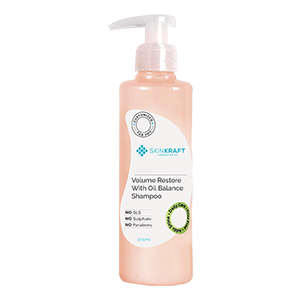If you're a frequent swimmer, you're probably aware that chlorine can seriously wreck your hair. Although chlorine is great for wiping out harmful bacteria and keeping the pool water clean, it's also harsh on your hair.
Did you know that tap water also contains chlorine? So, if you take regular showers in water that has high chlorine content, it may irritate or cause damage to your scalp and hair.
In this article, we dive deep into understanding chlorine's effects on your hair and how to treat and prevent chlorine damaged hair. Read on for more.
Highlights:
What Does Chlorine Do To Your Hair?
While occasional exposure to chlorinated water might not be a cause of concern, regular exposure can be a problem.
- Chlorine can strip off natural oils from your hair, leaving it dry and brittle.
- Regular exposure to chlorine can make your hair highly porous.
- Chlorine can change the color of your hair.
- It can weaken your hair strands, resulting in split ends.
- If your skin is sensitive to chlorine, it can result in an itchy and irritated scalp.
Can Chlorine Damage Your Hair?

Yes. Prolonged and regular exposure to chlorinated water can cause significant damage to your hair.
How To Treat Chlorine Damaged Hair
It's easy to detect chlorine damaged hair. Your hair may become extremely dry and frizzy, while it remains tangled all the time. However, the good news is, you can revive and fix chlorine damaged hair.
Here are some tried and tested ways that you can try at home.
Note:
Before you do anything about your chlorine damaged hair, it is important to understand its degree. Speak to your hairstylist to determine what treatment will be best for your hair.
1. Use a hair clarifier while washing your hair. A hair clarifier removes any harsh chemicals from your hair. You can either go for a clarifying shampoo or make a clarifier at home using baking soda and apple cider vinegar.
2. Chlorine does not just dry your hair out, but it may also affect your scalp. It is essential to check for your scalp health. Is it too dry or flaky? Speak to your doctor to understand how you can treat your damaged scalp.
3. For severely chlorine damaged hair, you need to deep condition at least two times a week. Alternatively, you can use coconut oil to replenish lost moisture. Massage your hair gently with lukewarm coconut oil to improve your hair and scalp health. Leave it on for some time and then shampoo.
4. Repairing damaged hair may take a lot of time. You need to have a lot of patience and follow a healthy haircare routine to see improvement.
How To Prevent Chlorine Damaged Hair

You can take a few steps before and after hitting the pool to prevent chlorine from damaging your hair. Here's what you should remember:
1. After swimming in a pool, rinse your hair immediately to remove any chlorine traces from your hair. Washing with normal water will prevent the build-up of chlorine, salt, or other metals.
2. Keep your hair's length short or trim your hair every three months. Regular trims can help prevent additional damage and keep your hair healthy.
3. Apply a generous amount of coconut oil on your hair before you get in the pool. The coconut oil works as a barrier and will not allow the chlorine to sit on your hair.
4. Tie your hair in a bun, knot, or a braid to avoid soaking your hair in the water, especially when you're in a pool or the sea. Try to keep your head out of the water as much as possible.
5. One of the best ways to protect your hair from chlorine is to rinse your hair with clean tap water before entering the pool. When your hair is already wet and saturated with clean water, it will absorb less chlorine water.
6. If you swim regularly in chlorinated water, consider wearing a silicone swimming cap. It will prevent your hair from getting wet and protect it from chlorine water.
7. While shampooing helps remove chlorine deposits from your hair, it is also important to replenish your hair's natural moisture that chlorine has ripped off. Use a protein-rich conditioner after each wash to nourish your dry hair.
8. Wet hair is usually tangled, and vigorously brushing can damage it. Use a soft wide-toothed comb to detangle your wet hair.
Who’s At Risk?
- If you have colored or chemically-treated hair, your hair is at a higher risk of getting damaged by chlorine.
- Chlorine can be extremely harsh on hair that is thin and fine.
- If you already have dry and damaged hair, then chlorine can cause even more damage to your hair.
- Permed or bleached hair is also more vulnerable to chlorine water.
Does Chlorine Turn Your Hair Green?
No. Contrary to the popular belief, chlorine does not turn your hair green. Your hair turns green due to the presence of hard metals such as copper, manganese, and iron in the pool water. However, chlorine does play a role in oxidizing these metals. The metals then stick to your hair and turn it green, while making your hair color look extremely dull and ashy.
Wrapping Up
Chlorine may be the worst part of pool water for your hair. However, it is required to kill unwanted germs in there. Since you can't avoid it altogether, the best thing you can do is understand what chlorine does to your hair and give it the right care and treatment. With this knowledge, you can also take appropriate measures to prevent chlorine from damaging your hair.
Recommended Products
Was this Article helpful?
- Least helpful
- Most helpful











